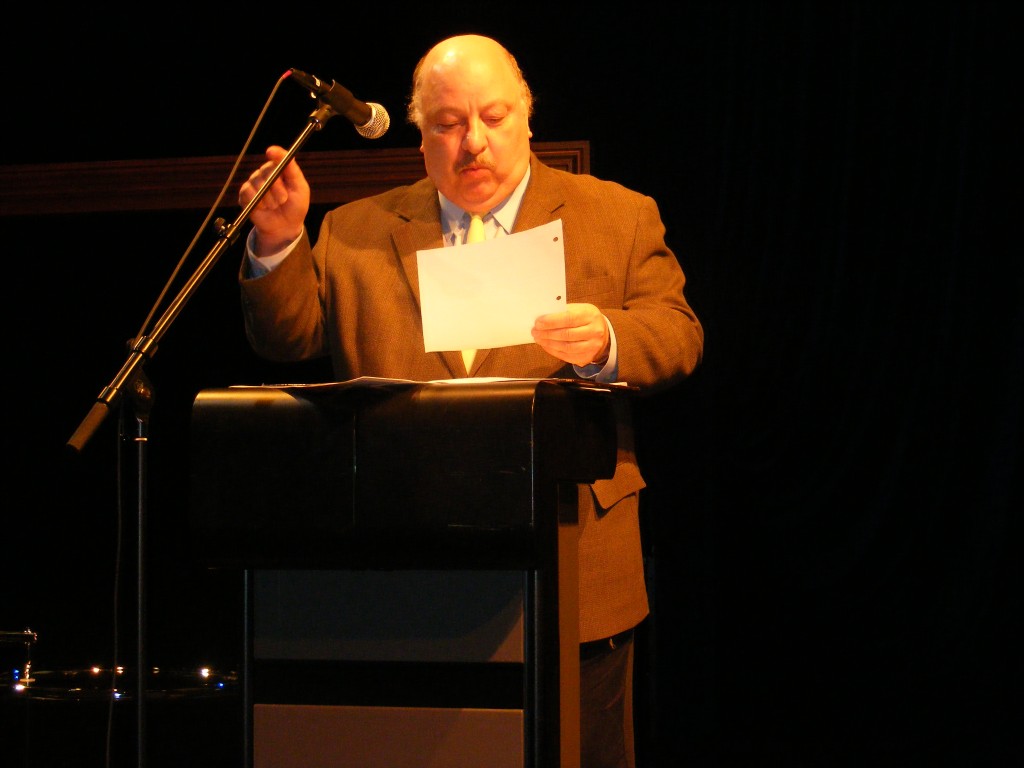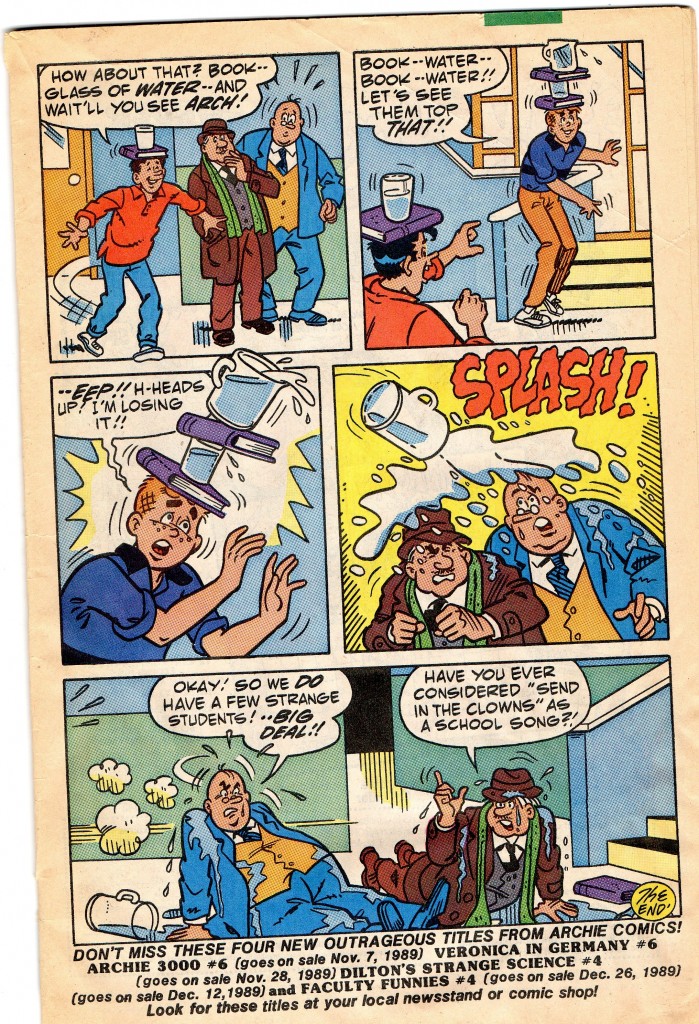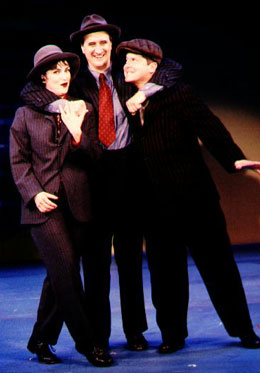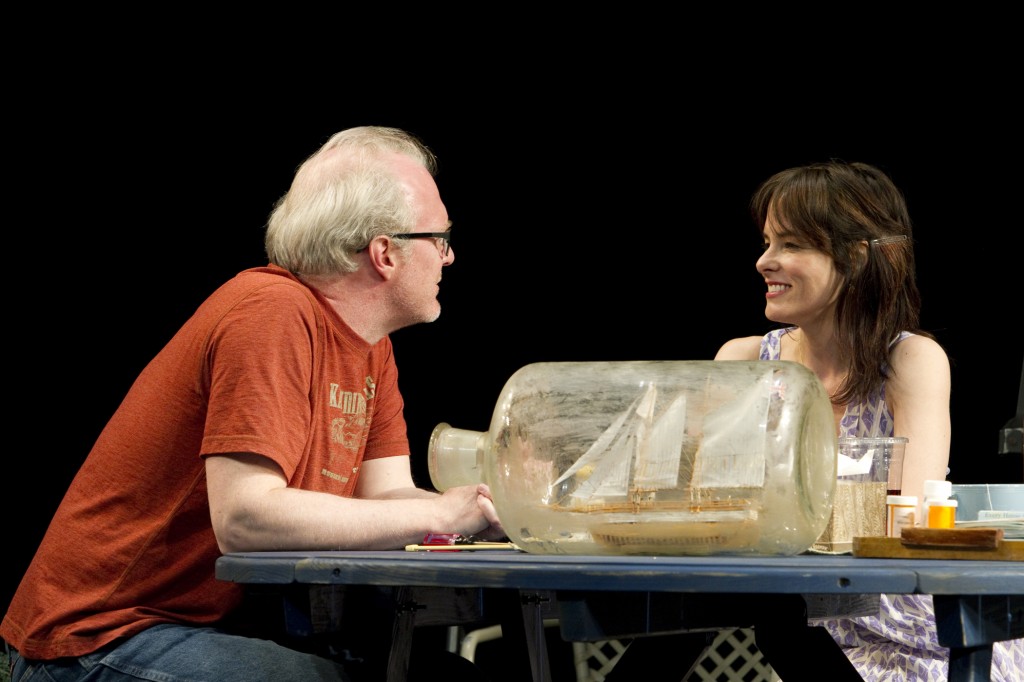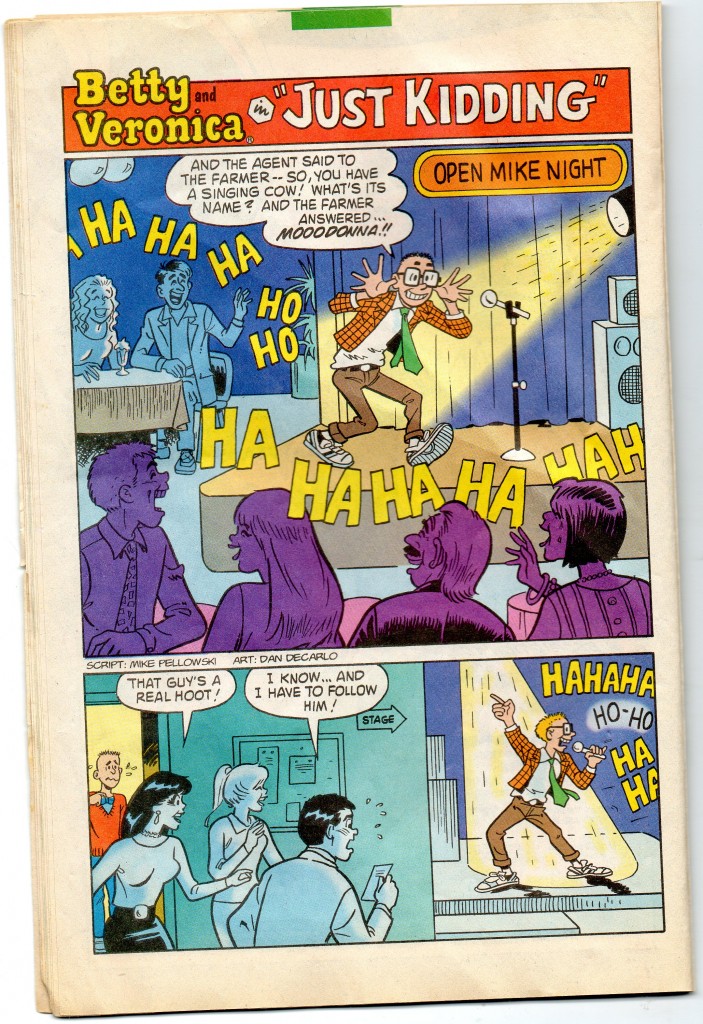
Ari Brand's name is Asher Lev in My Name is Asher Lev at the Long Wharf Theatre through May 27. Photo by T. Charles Erickson.
My Name is Asher Lev
Through May 27 at the Long Wharf Theatre, 222 Sargent Dr., New Haven. (203) 787-4282, www.longwharf.org.
By Aaron Posner, adapted from the novel by Chaim Potok. Directed by Gordon Edelstein. Set design: Eugene Lee. Costume design: Ilona Somogyi. Lighting design: Chris Akerlind. Sound design: John Gromada. Stage manager: Bonnie Brady. Performed by Ari Brand (Asher Lev), Melissa Miller (Riv and others) and Mark Nelson (Ari and others).
The opening lines of the play My Name is Asher Lev are the same as the opening lines of Chaim Potok’s book My Name is Asher Lev.
Namely, “My name is Asher Lev.” The introduction is a fuller one than, say, “Call me Ishmael” from Moby Dick. The declaration becomes a sort of mantra, uttered at junctures in the play when the protagonist’s identity is beginning to form, or is challenged, or is in doubt.
The wonder of Potok’s book is how it shows a young man jostled by the need to follow his family’s faith and traditions while exploring whole other beliefs and value systems. Self-awareness and integrity must guide him through every tough life choice. Posner’s adaptation illustrates how Asher’s desires run parallel to each other without ever quite touching. The way that’s conveyed dramatically, in a script that’s has enough work to do just telling Potok’s expansive decades-long story without layering any special interpretations atop it, is to have the title character continually remind us of his name.
At first, it’s an indentifier:
My name is Asher Lev.
The Asher Lev.
The “notorious” and “legendary” Lev, the painter of the
Brooklyn Crucifixions.
In an early scene, when Asher is age six (“and three quarters”), dealing with a doting uncle who’s recognized Asher’s prodigious drawing talent and deems him “A little Picasso. A little Chagall,” the response is “No. My name is Asher Lev.”
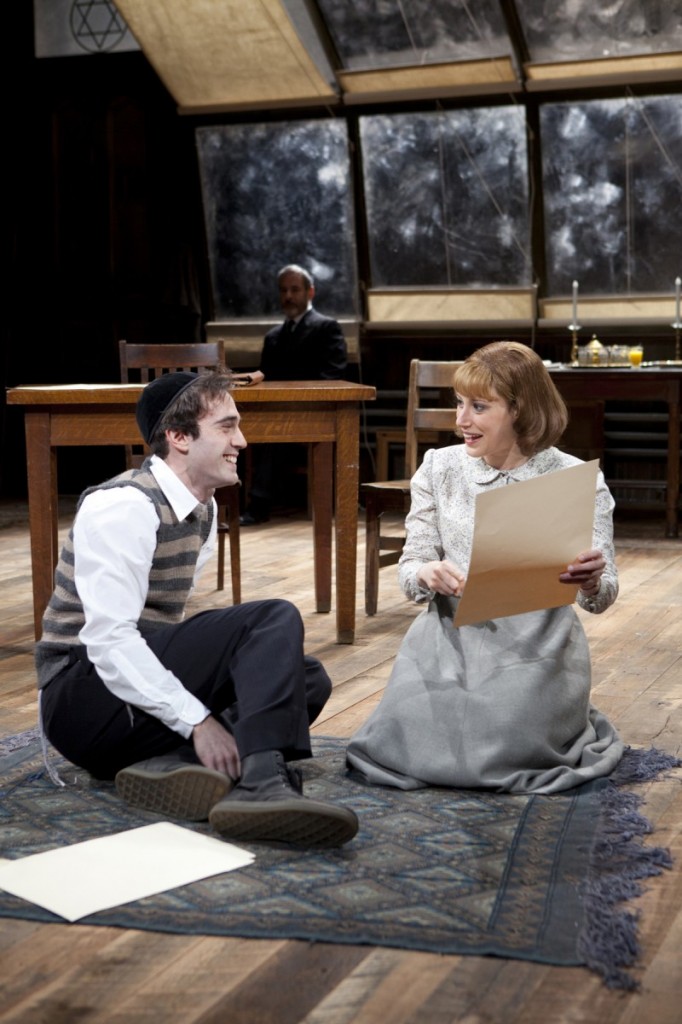
Ari Brand as Asher Lev and Melissa Miller as his mother Riv, in My Name is Asher Lev at the Long Wharf Theatre. Photo by T. Charles Erickson.
The phrase is repeated when Asher meets his artistic mentor Jacob Kahn, halfway through the play. “My name is Asher Lev” comes up one last time near the end when his controversial paintings have been not only praised and savaged in the press but jolted his religious community and his family. In this final instance, as in the play’s similarly self-expressive opening, Asher starts itemizing all the aspects of his identity. Emphases have shifted. Other names come into play. We’re aware of the relationships and influences which have now shaped Asher Lev’s individuality.
You’ve got to admire the economy and reliable structure of Aaron Posner’s adaptation. He doesn’t try to take Potok’s story into new territory. He simply tries to relate it in theatrical terms—a different sort of artistry than Potok uses, or which he writes about. Asher Lev’s artwork, the script insists, should not be shown, just suggested with blank sketchpapers and canvases so that the viewer (like Potok’s readers) can use their imaginations to fill in the pictures. Not that a title like Brooklyn Crucifixions, and Asher’s carefully spoken description of the paintings, doesn’t convey plenty, but it’s best not to clutter the plot with personal taste. This isn’t a story of great art, but of the artist and how he made it.
Gordon Edelstein, who chose to produce and direct My Name is Asher Lev when a previously announced adaptation of another classic Jewish-themed novel, Sophie Choice, fell through, is well matched to this material. Edelstein likes spare stages and large expanses of verbiage. He likes his dramas deep and his characters weighty. He’s interested in spatial relationships as well as emotional ones, and on the large yet bare stage area here (designed by Eugene Lee, master of scenic urban realism). The actors circle each other warily while they’re talking, or they touch fleetingly to underscore a connection. They lounge about the floor, or they have a stilted conversation at a table, the lack of movement mirroring the superficial conversation that’s loaded with things unsaid.
When the action really gets going—when passions are animatedly displayed or rage must be physically contained—the limitations of such a text-heavy, plotbound script are evident. Ari Brand, as Asher Lev, is able to keep a balance, smoldering and internalizing in a manner which suits both his narrator duties and his played-out exchanges with his parents and mentors. As the all-purpose supporting cast, Melissa Miller and Mark Nelson don’t have the same opportunity to even out their time onstage. Miller and Nelson each have some characters who hover in the background, subordinate to Asher and his ascension, and others (his mother, his art teacher) who dominate and inspire him. Some characters who get much more attention in the book have to be enlivened in just a few lines onstage. Sometimes, the characters (a nude model, a schoolteacher) are reduced to little more than props, fuelling the central coming-of-age story. You can excuse the actors for chewing the scenery at times; the opportunities are infrequent, and the audience loves the distraction from the textbound narrative. Mark Nelson’s brash, lunatic portrayal of Asher’s art teacher Jacob Kahn is a particular delight.
Smatterings of unevenness in the performances notwithstanding, the stage version My Name is Asher Lev is full of canny overlaps and intersections, joing the lead player’s religious beliefs to his burgeoning artistic ones. When Jacob Kahn blurts out “Do not lie!” when criticizing one of Asher’s canvases, it’s delivered with the same conviction as the teachings Asher receives from his parents and rabbi.

Mark Nelson as Jacob Kahn and Ari Brand as Asher Lev in My Name is Asher Lev at the Long Wharf Theatre. Photo by T. Charles Erickson.
In some scenes, the differences between the calls of Asher’s faith and his art are made into a joke.
KAHN. Good. It is my nature to be blunt. You are entering the
world of the goyim, Asher Lev. Do you know that?
ASHER. Yes.
KAHN. Not only goyim, Christian goyim.
ASHER. Yes.
KAHN. Better you should be a laborer. Better you should be a
lawyer. (No answer.)
In most respects, though, Posner’s adaptation—Edelstein’s direction—delivers exactly the right blend. It doesn’t just show how a young man’s world is rocked when he tries to reconcile his artistic temperament with the observance of his Jewish heritage. It shows how, given the conviction Asher Lev brings to both these parts of himself, how the combining of these spiritual urges isn’t bizarre—it’s essential to a character who’s clearly shown us his honesty and integrity and dedication.
This is a modest show about a great inner struggle. The restraint is admirable, and the grand message still gets across.



